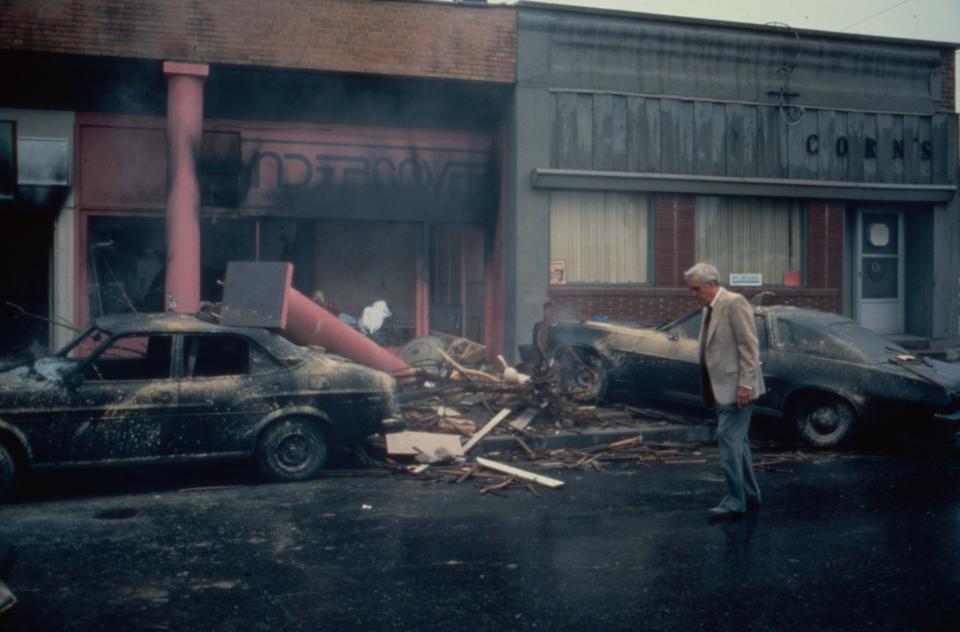'The Day After' left viewers shell-shocked 40 years ago. Documentary explores its impact
- Oops!Something went wrong.Please try again later.
Forty years ago, the eyes of a nation were upon Lawrence — or at least a fictionalized version of that city, in which people were dying horrible deaths from nuclear radiation.
More than 100 million people watched on Nov. 20, 1983, as ABC-TV aired "The Day After," a graphic film depicting the ravaging effects of a Soviet nuclear strike upon residents of Middle America.
The film, which deliberately left it unclear which side fired first, then aired in 1987 on Soviet television.
It has been credited with helping end the Cold War between the U.S. and the Soviet Union — and perhaps saving the world.

Documentary about 'The Day After' to be shown Monday
A celebration marking the 40th anniversary of the airing of "The Day After" will be at 6:30 p.m. Monday at Liberty Hall, 644 Massachusetts in downtown Lawrence.
It will feature the commercial premiere screening of "Television Event," a documentary about "The Day After" directed and produced by Jeff Daniels, a 45-year-old documentary filmmaker.
Tickets are $12 each and can be purchased on the Liberty Hall website — but they're going fast, Daniels told The Capital-Journal on Friday.
"It's been a dream of mine to show this to the Lawrence community," Daniels said.
He said he considered it appropriate that "Television Event" is first being commercially screened in downtown Lawrence, where buildings were burned and more than 150 people massacred during Quantrill's Raid in 1863.
"Television Event" will air next year on PBS, Daniels said.

Monday's event to feature question-and-answer session
Monday's film screening will be followed by a "40th anniversary reunion" question-and-answer session featuring Daniels and eight people who were involved with the filming of "The Day After," the Liberty Hall website said.
Daniels said some of the participants, including himself, will be there in person.
Others — including actor Steve Guttenberg, who was among the stars of "The Day After," and Nicholas Meyer, who was its director — will take part by Zoom.
In addition to Guttenberg, Daniels and Meyer, question-and-answer session participants will be producers Bob Papazian and Stephanie Austin; actress and Lawrence local Ellen Moore, who played "Jolene Dahlberg"; local casting agent Jack Wright; and David Longhurst, former mayor of Lawrence.
'A nuclear bomb on the American living room'
"The Day After" essentially "dropped a nuclear bomb on the American living room," Daniels said.
He said that though he was only 5 years at the time and was put to bed before the end of the film, he still came to realize that nuclear war could bring devastating effects at "the press of a button."
Daniels, who now lives in Australia, said one central theme of "Television Event" involves how the arts can be a vital means of enabling people to confront issues they would rather ignore, such as the threat of a nuclear holocaust.
"The Day After" connected with people on a personal level and enabled them to speak with each other — despite their differing political views — about a subject that was vital to the future of the world, Daniels said.
He said "Television Event" tells an important and riveting story about Hollywood director Meyer — who was trying to do some good — going up against ABC-TV, which was focused on getting high ratings.
Both succeeded.
"The Day After" became the most-watched TV movie ever, a record that still stands.
The film also "changed the conversation politically" regarding the effects of nuclear war, Daniels said.
'Sleepwalking toward nuclear disaster'
The message "The Day After" shares about the ravaging effects of nuclear war remains crucial today, Daniels said.
"At a time when the world seems to be sleepwalking toward nuclear disaster, ('Television Event') aims to shake us into recognizing the danger," said a news release promoting that film.
The "good versus evil" story told to Americans regarding the Soviet Union in the 1980s has been replaced by circumstances in which nine or more countries admittedly possess nuclear weapons, Daniels said.
"Because it's a more complicated problem, a lot of people find it easier to dismiss the threat of nuclear war," he said. "But the scientists say the threat is more real than ever. We absolutely need to be afraid."
Contact Tim Hrenchir at threnchir@gannett.com or 785-213-5934.
This article originally appeared on Topeka Capital-Journal: Lawrence event to mark 40th anniversary of airing of 'The Day After'

